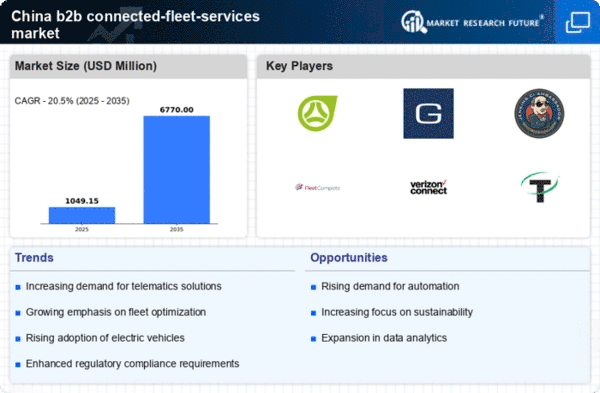Rising Demand for Fleet Optimization
The b2b connected-fleet-services market in China is experiencing a notable surge in demand for fleet optimization solutions. Companies are increasingly seeking ways to enhance operational efficiency and reduce costs. This trend is driven by the need to manage logistics more effectively, as the transportation sector accounts for a significant portion of China's GDP. According to recent data, logistics costs in China represent approximately 14% of GDP, which is higher than the global average. As businesses strive to streamline their operations, the adoption of connected fleet services that provide real-time tracking and analytics is becoming essential. This shift not only improves route planning but also minimizes fuel consumption, thereby contributing to overall cost savings and increased competitiveness in the market.
Government Initiatives and Regulations
The b2b connected-fleet-services market is significantly influenced by government initiatives and regulations aimed at modernizing the transportation sector in China. The Chinese government has implemented various policies to promote the adoption of advanced technologies in logistics and transportation. For instance, the 'Made in China 2025' initiative emphasizes the integration of smart technologies in manufacturing and logistics. Additionally, regulations concerning emissions and safety standards are pushing companies to adopt connected fleet solutions that ensure compliance. As a result, businesses are increasingly investing in technologies that enhance fleet management and reduce environmental impact, thereby driving growth in the b2b connected-fleet-services market.
Growing Focus on Safety and Compliance
Safety and compliance are becoming increasingly critical factors influencing the b2b connected-fleet-services market in China. With rising concerns over road safety and regulatory compliance, companies are prioritizing solutions that enhance driver safety and vehicle performance. The implementation of connected fleet services allows for the monitoring of driver behavior, vehicle health, and adherence to safety regulations. This focus on safety not only helps in reducing accidents but also minimizes liability risks for businesses. As a result, the demand for connected fleet solutions that provide comprehensive safety features is expected to grow, further propelling the market forward.
Shift Towards Data-Driven Decision Making
The b2b connected-fleet-services market is witnessing a shift towards data-driven decision-making among businesses in China. Companies are increasingly recognizing the value of data analytics in optimizing fleet operations and improving overall performance. By leveraging data collected from connected vehicles, businesses can gain insights into fuel consumption, maintenance needs, and driver performance. This analytical approach enables companies to make informed decisions that enhance efficiency and reduce operational costs. As the importance of data in strategic planning continues to rise, the demand for connected fleet services that offer robust analytics capabilities is likely to increase, driving growth in the market.
Technological Advancements in Connectivity
Technological advancements in connectivity are playing a crucial role in shaping the b2b connected-fleet-services market in China. The proliferation of 5G technology is enabling faster and more reliable communication between vehicles and fleet management systems. This enhanced connectivity allows for real-time data exchange, which is vital for effective fleet monitoring and management. Furthermore, the integration of artificial intelligence and machine learning into fleet services is facilitating predictive maintenance and improved decision-making. As these technologies continue to evolve, they are likely to enhance the capabilities of connected fleet services, making them more attractive to businesses looking to optimize their operations.
















